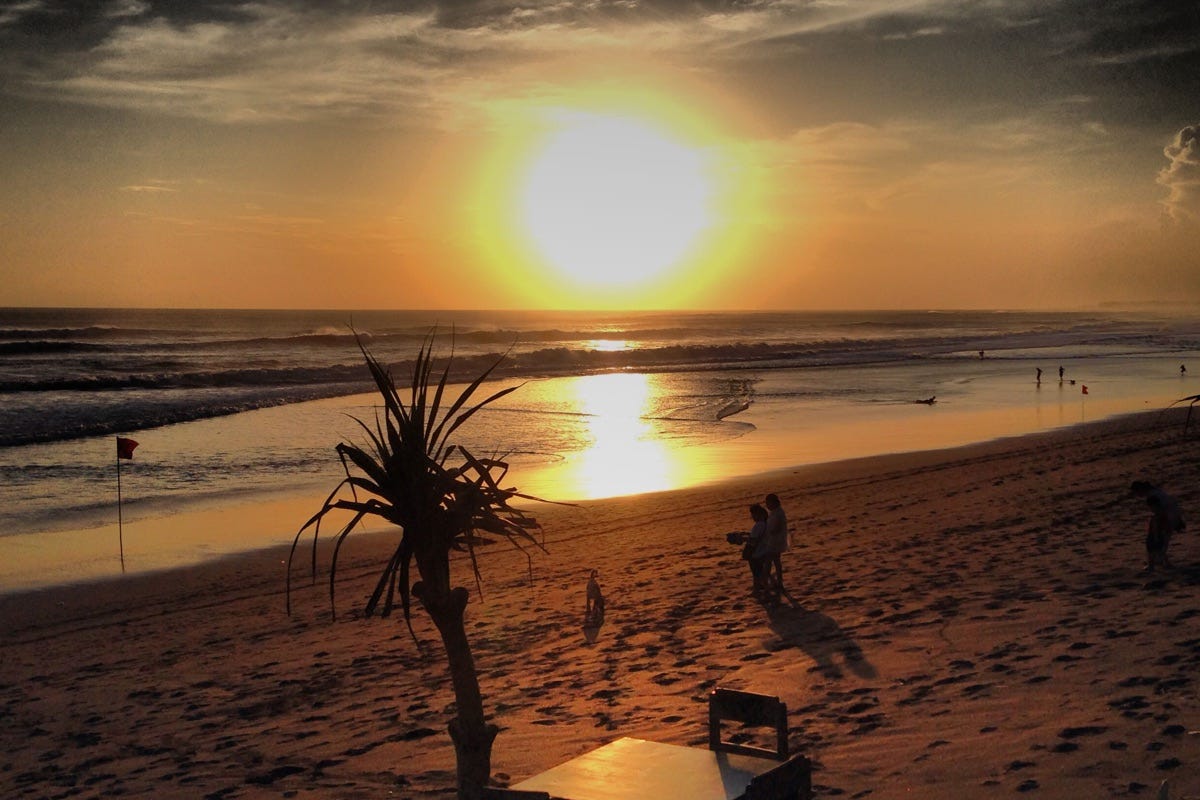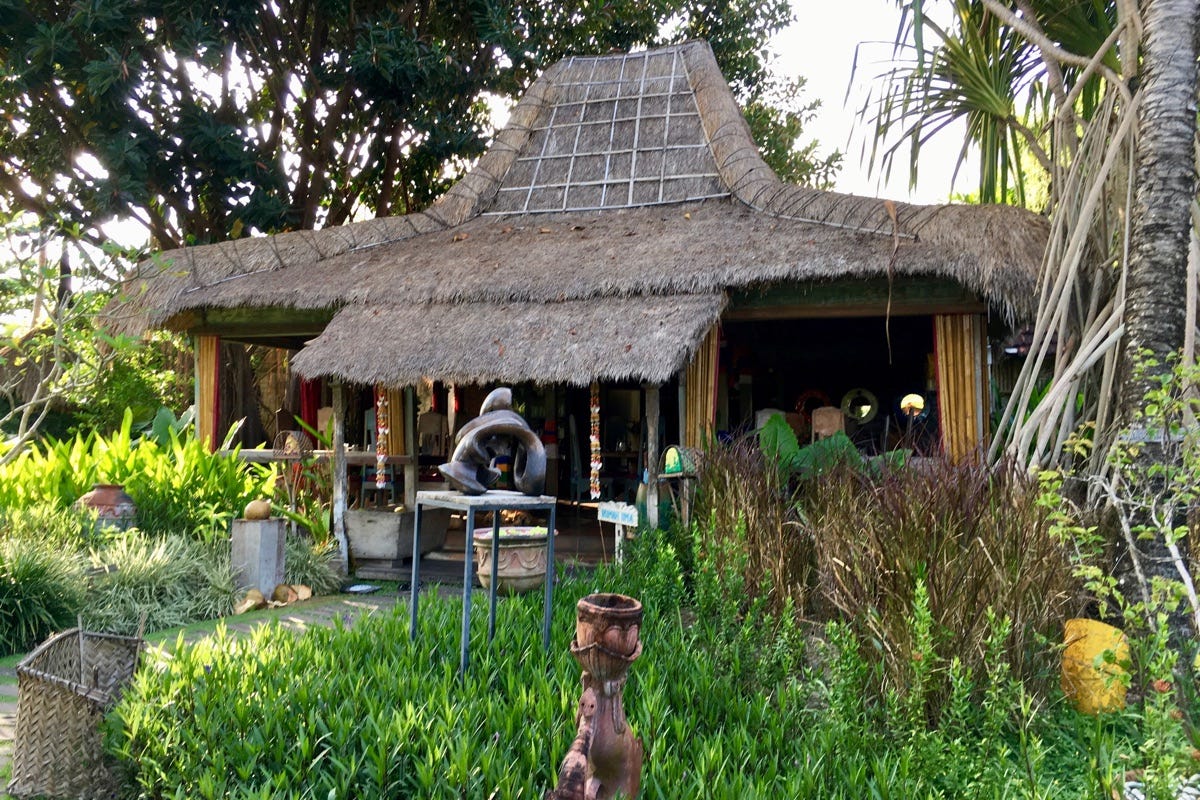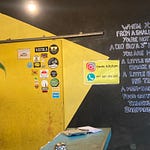It is about a five-minute ride from my house to the beach, and I head down most mornings to do some writing by the sea. It is a straight run down Jl Pettitenget, which is far quieter than pre-Covid times when it resembled a parking lot. Today, it is more like a speedway—in the mornings at least.
So trundling down, stuck behind two loaded trucks, another bike sidled up beside me. The rider was foreign, not wearing a helmet nor mask, but did have on a set of gigantic earphones. Nearing a blind bend, they went to overtake. It was a reckless move, and when a car came the other way, they tried to accelerate their way out of it. When that wasn’t going to happen, they braked hard and veered back, behind the truck, almost knocking me off my bike in the process. They finished their work of speeding modern art by careening onto the footpath and crashing the bike.
Might need to come back tomorrow—and next year—and the year after. Photo: Stuart McDonald.
The trucks didn’t slow down—I’d guess they were unaware of what had happened. When I pulled up and walked back to check on the rider, bloody but not beaten, they launched into a tirade aimed at everyone except themselves. I left.
In itself, none of the above was unusual. I’ve seen no shortage of scooter idiocy here—by both Indonesians and foreigners alike. Plenty of prangs, though thankfully only the one fatal accident. Pre-Covid, tourist meets scooter accident meets voided (or non-existent) insurance, meets GoFundMe campaign were dime a dozen. Like the gem scams in Bangkok, the card scams in Phnom Penh and so on, some people seem to want to learn the hard way.
This is now a restaurant and car park. Umalas. Photo: Stuart McDonald.
It isn’t entirely their fault I guess. Well, it is, but there are varying levels of slackness of enforcing existing laws by officialdom as well. Police take a payoff rather than levy a fine for no helmet or take a cut from the gem store or the card sharks. The world keeps turning for most—if not all. In the scheme of things, these tales of the unfortunate remain a footnote, a rounding error, to the millions who have an uneventful vacation.
Yet in an “if it bleeds it leads” world, the uneventful vacation doesn’t make the papers, so instead, these are the stories we read. In a way, they serve as a counterpoint to the newspaper travel section where unspoilt beaches and smiley residents prevail. An accurate picture is somewhere between the two extremes.
Often, no improvements are required. Batu Belig sunset. Photo: Stuart McDonald.
As the region stutters its way through a hodgepodge of re-openings, there has been a new style of tourism story. One that tends to come out of destinations that saw the worst of overtourism, Kyoto for example. They argue that residents, now accustomed to having their town back, quite like it bereft of tourists. If you had the misfortune of being in Bangkok, Bali or Boracay in 2019’s heady days, it’s an easy sentiment to grasp.
Of course, not everyone feels this way. In particular, the many who had tourist-facing livelihoods would like their jobs back. Likewise, countries that were over-dependent on inbound tourism would like their dollars back. Tourism though, brushes with an uneven hand—it doesn’t float all boats.
This is one of the reasons why nations need to think about what post-Covid-19 tourism is going to look like. There’s all the blah blah about big-spending tourists, but let’s face it, the region has been talking about this since the 1970s and they’re yet to replace normal people. Don’t get me wrong—I don’t see anything amiss with wanting tourists to spend money—someone has to pay for the infrastructure that supports them. Making their spending the sole determining factor though, seems short-sighted.
Desa Seni—sustainability surrounded by the less so. Photo: Sally Arnold.
Two stories from yesterday are instructive. One was an announcement out of the EU about their long term goals for tourism. Titled the Transition Pathway for Tourism, it is a dense document (though readable by EU standards). Heavy on sustainability- and resilience-speak, in a section on tourism to rural and remote areas, they write:
“The EU can boost the long-term resilience of remote regions by comprehensive smart and sustainable tourism strategies, based on the unique strengths of the region, well-planned market segmentation, diversification of tourism services to different customer bases and by integrating the wellbeing of local residents with the services provided for tourists.”
The second was a statement reported yesterday out of Labuan Bajo in Indonesia’s Flores. The town is to be one of the country’s “super-premium” destinations and has seen a tonne of investment. Not all are fans of the changes the investment has brought, but on how Bali’s G20 could benefit Flores, the story reads:
"The calculation assumes that G20 tourists have seven times the purchasing power of tourists in general. Ten side meeting activities with approximately 800 participants multiplied by US$2 thousand. This is still a rough calculation, not to mention if there are participants who want to increase their stay."
Perhaps it is unfair comparing a single comment to an EU report. That said, I’ve been reading this sort of coverage side by side for a while now and different visions are playing out around the planet.
Please don’t ask me what this is being replaced by. Berawa Beach. Photo: Stuart McDonald.
For residents to want tourists to return in any form, the changes that come with them need to do a few things. Sure, they need to be sustainability-minded, but that is just the foundation. They need to benefit residents and improve their lives beyond a paycheck. Residents are more likely to forgive the price they pay for the idiotic few we read about in the papers if they feel it buys a better life for their children. Governments whose vision is squarely on today’s rather than tomorrow’s money are selling their people short.
So what does this all have to do with a maniac on a scooter on the beach road this morning? For me, a lot of it boils down to respect—or lack thereof. It goes both ways—seeing foreign visitors as nothing more than a cash cow likewise lacks respect. I think it is fair to say most foreign tourists travel somewhere because they have an interest in the place. So, why is it so difficult for countries to see the benefits of building on this interest? The whole turning tourists into advocates, furthering cross-cultural understanding and all that. That is a thing, right?
Tourism can mix things up—in a good way. Mural, Kuta Beach. Photo: Sally Arnold.
Fixating on short term pay-offs that benefit the select few will only deliver long-term costs for the many. And that is about as intelligent as riding down to the beach without a helmet.
Couchfish is 100 per cent independent and reader-supported. If you’re not already a subscriber, and you’d like to show your support, become a paying subscriber today for just US$7 per month—you can find out more about Couchfish here—or simply share this story with a friend.
Don’t forget, you can find the free podcasts on Apple, Pocket Casts and Spotify as well as right here on Couchfish.



















Share this post